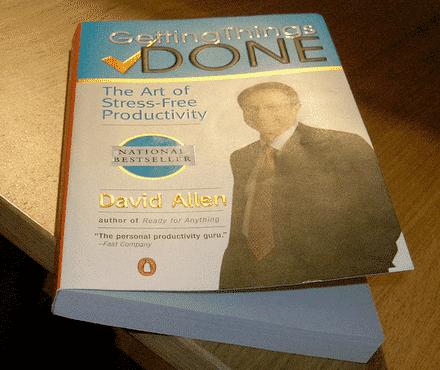GTD Basics

Collect
Capture everything that you need to track or remember or act on in what Allen calls a ‘bucket’: either a physical inbox, email inbox, tape recorder, notebook, or any combination of these. Get everything out of your head and into your collection device, ready for processing. All buckets should be processed to empty at least once per day.
Process
When you process your inbox, follow a strict workflow:
Start at the top.
Deal with one item at a time.
Never put anything back into ‘in’.
If an item requires action:
If not,
The 2-minute Rule: If it would take less than 2 minutes to do something, just do it right away. Two minutes is a guideline, roughly the time it would take to formally defer the action.
Organize
Allen describes a suggested set of lists which you can use to keep track of items awaiting attention:
Next actions – For every item requiring your attention, decide what is the next action that you can physically take on it. For example, if the item is ‘Write project report’, the next action might be ‘Email Fred for meeting minutes’, or ‘Call Jim to ask about report requirements’, or something similar. Though there may be many steps and actions required to complete the item, there will always be something that you need to do first, and this should be recorded in the next actions list. Preferably, these are organized by the context in which they can be done, such as ‘in the office’, ‘by the phone’, or ‘at the store’.
Projects – every ‘open loop’ in your life or work which requires more than one physical action to achieve becomes a ‘project’. These are tracked and periodically reviewed to make sure that every project has a next action associated with it and can thus be moved forward.
Waiting for – when you have delegated an action to someone else or are waiting for some external event before you can move a project forward, this must be tracked in your system and periodically checked to see if action is due or a reminder needs to be sent.
Someday/Maybe – things that you want to do at some point, but not right now. Examples might be ‘learn Chinese’, or ‘take diving holiday’.
A calendar is also important for keeping track of your appointments and commitments; however, Allen specifically recommends that the calendar be reserved for what he terms the ‘hard landscape’: things which absolutely have to be done by a particular deadline, or meetings and appointments which are fixed in time and place. ‘To-do’ items should be reserved for the next action lists.
A final key organizing component of GTD is the filing system. Getting Things Done says that a filing system, if it is to be used, must be easy, simple and fun. Even a single piece of paper, if you need it for reference, should get its own file if it doesn’t belong in a folder you already have. Allen’s suggestion is that you keep a single, alphabetically organized filing system, in order to make it as quick and easy as possible to store and retrieve the information you need.
Review
The lists of actions and reminders will be of little use if you don’t review them at least daily, or whenever you have time available. Given the time, energy and resources that you have at that particular moment, decide what is the most important thing for you to be doing right now, and do it.
At least weekly, the discipline of GTD requires that you review all your outstanding actions, projects and ‘waiting for’ items, making sure that any new tasks or forthcoming events are entered into your system, and that everything is up to date. Allen suggests the creation of a tickler file > in order to help refresh your memory each week with your outstanding tasks and projects.
Do
Any organizational system is no good if you spend all your time organizing your tasks instead of actually doing them! David Allen’s contention is that if you can make it simple, easy and fun to take the actions that you need to take, you will be less inclined to procrastinate or become overwhelmed with too many ‘open loops’.
(All Content From Wikipedia’s Article on GTD >)
[ Nov 19, 2006 ]